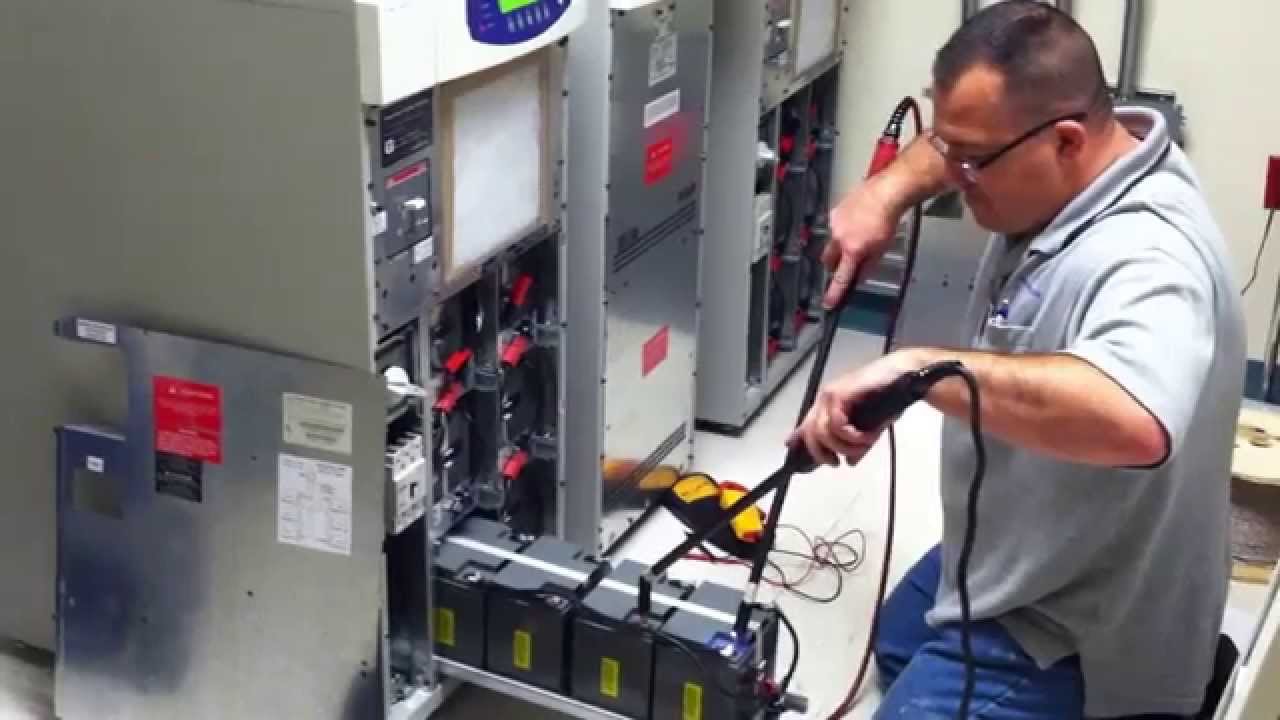-
Course Code
EPET-012

UPS and Battery System
- This course is an introductory power system course that covers basics of power system apparatus including synchronous generators, transformers, transmission lines, AC motors, and distribution systems. The course starts with an overview of single-phase and three-phase AC circuits, next, per unit quantities and single-line diagram of electrical systems are covered.
- The course also covers the principles of operation of AC machines including synchronous generators/motors, and induction motors. Synchronous generators are the most important generation units in a power system. This training course covers the basic operation principles of synchronous machines, their simplified models, and their power flow diagrams. Through power system analysis training, you will also learn the operation of single-phase and three-phase transformers, ideal transformers, autotransformers, tap changers, and equivalent circuits of various transformers in power system. Finally, power system analysis training will briefly introduce the power flow concept, DC and AC power flow, and introduces you to the distribution systems.
Learning Outcomes
- Understand the Basic Building Blocks Common to all UPS Systems
- Have a knowledge of the Construction and Operation of the Major Types of Industrial UPS Systems
- Understand how to maintain and Perform Test Lead-Acid and Ni-cad Battery Systems
- Be able to identify the Hazards and Safe Work Practices Related to UPS Systems and its Batteries
- Have learned basic troubleshooting techniques for UPS systems
- Be able to implement preventive maintenance for UPS battery and battery charger, and annual testing.
At the End of the Course Participants will be able to:
Course Contents
- What constitutes power quality?
- Sags and swells
- Voltage fluctuations and mitigation
- Interruptions
- Surges - their causes, effects and remedies
- Noise and harmonics
- Frequency disturbances and mitigation
- Interruptions and their impact
- Deciding the requirements of your plant and equipment
- Uninterrupted power - how much and where?
- Improving reliability by redundancy and automation
- Uninterrupted power options available?
- Rotary UPS systems
- Solid state devices - diodes, transistors, thyristors and IGBTs
- Basic configurations of rectifiers and their output waveforms
- Ripples and control
- Rectifiers in static UPS systems
- Controlled rectifiers and their impact on power factor
- Why are rectifiers treated as sources of harmonics?
- Basic principles of an inverter
- Synthesizing the AC wave
- Pulse width modulation technique of synthesis
- Static UPS
- Basic components of the general UPS configuration
- Passive standby, line interactive and double-conversion type of UPS
- Preferred metering, indication and alarms in a UPS
- Power quality and UPS
- Need for isolation transformer
- Computer power supplies and comparison of UPS configurations
- Rating of UPS systems - pitfalls
- Redundant UPS systems
- Earthing of UPS systems -recommendations from the IEEE Green Book
- Critically apply the manufacturer's recommendations
- Basic use of test equipment and tools
- Rectifier and Inverter troubleshooting
- Types of batteries: primary and secondary
- General features of lead-acid and nickel -cadmium batteries
- Comparison of the chemistry involved
- Lead acid batteries - subtypes, construction and relative features
- Manufacture of batteries
- Float charging and boost (equalizing) charging
- Facts about charging of lead acid batteries
- Internal loss and the factors that affect it
- Current during charging cycle - variants
- Overcharging and undercharging
- Sulphation and hydration
- The discharge process
- Specifics about charging of UPS batteries
- Nickel cadmium batteries
- Charging strategy for nickel cadmium batteries
- Matching the battery type to the application
- Life cycle cost of battery
- Battery configuration - selecting the voltage
- Use of parallel battery strings
- Alternative approaches to sizing of battery for DC supply systems
- Battery sizing for UPS systems
- Receiving, checking and storage
- Pre-installation planning and rack installation
- Installation of cells and inter cell connections
- Safety precautions
- Need for upkeep and monitoring
- Causes of failures and failure modes
- Periodic inspection and residual life assessment
- Test equipment and safety of personnel
- Predictive monitoring by conductance testing
- Disposal and recycling
- Selection and sizing
- UPS systems
- Batteries
- Combination of batteries and UPS systems
POWER QUALITY-BASIC FACTS
RELIABILITY AND CONTINUITY OF POWER SUPPLY
BASICS OF RECTIFIERS AND INVERTERS
STATIC UPS SYSTEMS
UPS SYSTEM TROUBLESHOOTING AND MAINTENANCE
BASICS OF BATTERIES
CHARGING AND DISCHARGING OF BATTERIES
SELECTION, CONFIGURATION AND SIZING OF BATTERIES
INSTALLATION OF BATTERIES
BATTERY UPKEEP, FAILURES AND DISPOSAL]
CASE STUDIES
Our Methodology
- Make coaching and monitoring innovative and using modern
- Media training also using on the go training by using interactive means and focusing on
- The exercises, practical applications and real situations study
- Live delivery method, instructor-led training
- Experienced consultant, trainers, and professional
- Qualified trainer with high-level experience
Attendance Reports
- Send daily attendance reports to training departments
- Send full attendance report to training dep. by the end of the course
- Attend 100 % from the course days also provide daily
- Issue attendance certificate for participant who attend minimum 80% from the course duration
Pre/Post Reports
- Pre- assessment before starting training
- Post assessment after finishing training
- Full report for the difference between Pre-& Post assessment
Who Should Attend
- MAINTENANCE TECHNICIANS Plant personnel responsible for maintaining the systems will benefit with an increased knowledge of the system.
- Instructors will demonstrate troubleshooting techniques to make quick, accurate, and effective repairs.
- Preventive maintenance techniques will be demonstrated to allow the equipment to operate at maximum reliability levels
